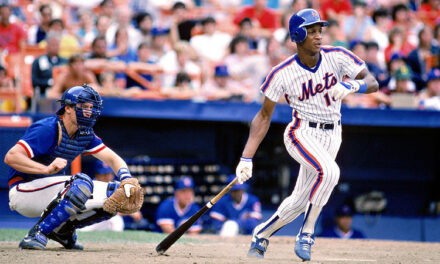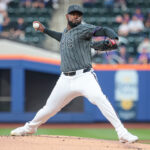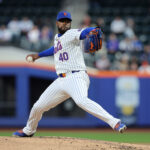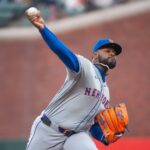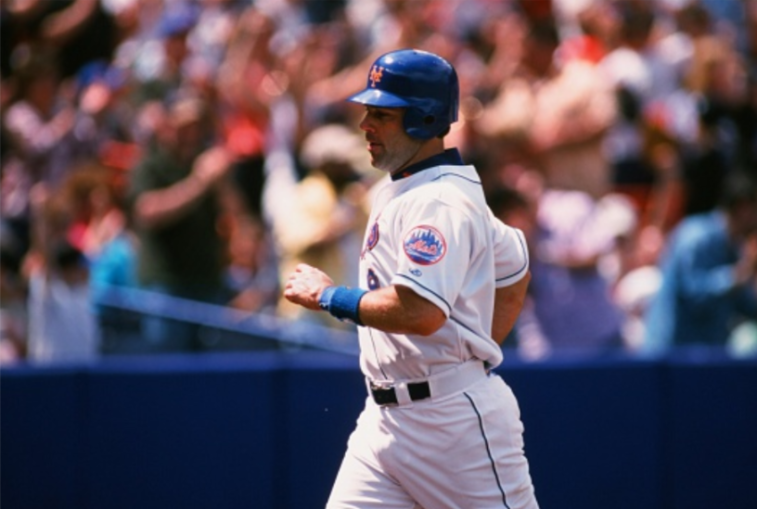
When you go to Todd Zeile‘s Twitter page, you’ll find an interesting bio description which reads, the “Forrest Gump of MLB.”
That tile is apropos for Zeile, as his career – which lasted sixteen years in the majors with eleven different teams – often led him to being a part of many compelling moments.
Just like the fictional character portrayed by Tom Hanks in the 1994 Oscar-winning film, Zeile was a man on the go who was a part of or witnessed a plethora of memorable moments and events from his impressive career in the majors.
For many, the constant disruption of switching teams could be challenging, though Zeile embraced the moves and saw an opportunity in each new team he found himself a part of.
And just like Gump, Zeile’s baseball career could be perfectly summed up in one of cinema’s most quotable lines, “Life is like a box of chocolate, you never know what you’re going to get.”
The well-traveled Zeile was fortunate to appear in 29 postseason games, including Game 1 of the 1996 ALCS against the New York Yankees, when a young fan by the name of Jeffrey Maier reached over the right field wall at Yankee Stadium to help Derek Jeter and the Yankees tie the game up at four in the eighth.
Just four years later, Zeile would find himself playing in the first Subway World Series in 2000, leading the Mets in hits (8) and OPS (.929).
Or how about June 29, 1990, just his 95th game in the majors. Zeile was on deck with one out in the ninth, watching as Dodgers left-hander Fernando Valenzuela got Pedro Guerrero to ground out for a game-ending double play, becoming the first Mexican to pitch a no-hitter.
In the game when future Hall of Fame second baseman Roberto Alomar infamously spat in home plate umpire John Hirschbeck’s face, Zeile was in the on-deck circle.
Along with the aforementioned Alomar, Zeile was afforded the opportunity to play alongside some of the game’s elite players, which included: Ozzie Smith, Sammy Sosa, Cal Ripken Jr., Ivan Rodriguez, Derek Jeter, Vladimir Guererro and Mike Piazza.
Zeile was also there at a time when fans in New York needed a chance to smile again, playing in the first baseball game in New York since the devastating terrorist attacks on September 11. Zeile and his teammates donned FDNY, NYPD and other first responder hats, despite objections from Major League Baseball on the dress code.
Zeile, who was the team’s player rep at the time, responded back with an emphatic statement: “We’re going to wear these hats and if MLB wants us to take them off they’re going to have come down here and rip them off our heads because we’re going to wear these the remainder of the season.”
The stories and moments come back so effortlessly when speaking to the 52-year-old, as he recollects on his early years in St. Louis, playing in the postseason with the Texas Rangers in back-to-back seasons in 1998-99, along with the countless friendships he’s made over the years.
Though, it’s easy to tell by the cadence in his voice the incredible fondness he holds for his years playing in Queens.
He cites the camaraderie those Mets’ clubhouses had as one of the main reasons the 2000 season ended with the team clinching their first pennant since the 1986 Championship season. The bonds forged led that group to “play loose,” in Zeile’s words. They played hungry and with a determination to show that they were a force to be reckoned with.
Zeile proudly likens that squad to a “cast of misfits,” noting that besides Piazza and Al Leiter the team did not have superstar talent, yet remained undivided to win 94 regular-season games and make it all the way to Game 5 of the World Series.
A business opportunity involving a multi-sport video game platform brought Zeile back to New York just a few years ago, which afforded him the chance to endear himself once again to Met fans. Zeile has appeared as a studio analyst for SNY over the past year-plus, and the Forrest Gump of baseball intends to continue sharing his insight and personal connections to the fans of the orange and blue.
I had the privilege of speaking with Zeile in early February, where we discussed his early years with the Cardinals, signing with the Mets in the winter of 1999 and memories from the 2000 season.
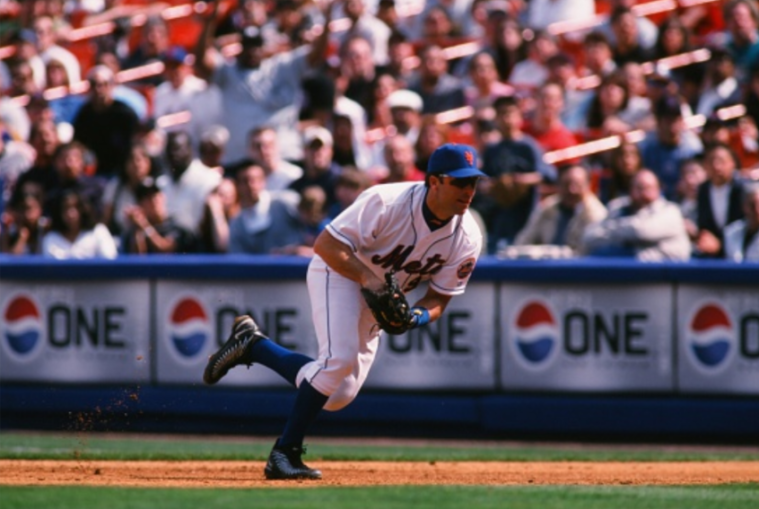
MMO: Growing up, who were some of your favorite players?
Todd: I grew up in Los Angeles. At the time in L.A., you kind of followed teams even more than players. My guys were the early to mid-’70s Dodgers, so Steve Garvey, Ron Cey, Davey Lopes and the rest of that infield, with Tommy Lasorda managing.
I would say the guy that I sort of most emulated as a kid was Garvey. With that upright stance and his approach at the plate; very still, upright and using the whole field.
At the same time, when I was about eight or nine-years-old, I read a book about Johnny Bench and did a book report on him because I was a catcher. I had this dichotomy of rooting for Bench and following some of the Reds even though the Reds, and the Dodgers in those days, early to mid-’70s, were big rivalries.
I kind of cherry-picked Bench and then all the Dodgers.
MMO: Who introduced you to the game early on?
Todd: I don’t remember ever not having [baseball] in my life. My dad was a big Dodgers fan and was a very good baseball player when he was younger. He attended the first game played at Dodgers Stadium and was a semi-pro player himself. Baseball was always kind of a part of my life.
I have a brother who’s fourteen months older. As young boys, we’d play any sport we could get our hands on and just kind of revolved around the season. We’d play football when it was wintertime, but all summer long we were playing baseball.
Growing up in California, we could get more exposure to baseball year-round.
MMO: What are your memories from the 1986 MLB Draft? Did you have any notion that the St. Louis Cardinals were looking to select you in the second-round?
Todd: No, weirdly I didn’t. I had really been highly sought after by the Angels, I think, and Kevin Malone at the time was sort of the key scout there. Some of the teams I knew had an interest but the Angels were the one team that approached me and said they were going to draft me in the first round, and really kind of tested my signability.
When I got the call the morning of the Draft from the Cardinals, they surprised me actually.
MMO: You mentioned to me on Twitter that you grew up wanting to be like Joe Torre. What was it like having him as a manager early on with the Cardinals, and then again in 2003 with the Yankees?
Todd: We have an amazing relationship, which, like a lot of relationships, stems from mutual respect. It was also not always easy, there were some tough times.
When Joe took over in St. Louis, it was after a very popular Whitey Herzog resigned because of front office issues. The first thing Joe ever said to me when he introduced himself was, “Don’t listen to what you hear. You’re my catcher and you’re going to stay my catcher.”
Two weeks later, I got moved to first base and I never caught another game until my last game, fourteen years later.
That was contentious at first because I didn’t want to make the move. I thought it was a move that was really stemmed in the front office, a financial move under a new regime of the Busch family that had taken over since August.
Joe and I had locked horns a little bit at first. He was kind of tasked with being the guy publicly that could help me make this transition because he had done it himself. We really bonded and I learned a ton from him with regards to some of the key points of my game, which was driving in runs and coming up in RBI situations. Just his approach and calmness he brought to the game was something that was a benefit to me.
And then, without going into all the details, in 1995, I agreed to a long-term deal with the Cardinals. But then they pulled it and tried to kind of brush it off. I wasn’t able to do that anymore with that owner. The long story short is I got traded at literally the eleventh hour before my arbitration hearing that year because they were done in the season that year due to the strike.
Joe was the one that called me. He had been working on my behalf to help facilitate the trade because he knew that it was the right thing because of what was going on internally. That was at midnight. Ten hours later they called him into the office after just having praised him the week before and fired him. I got traded and he got fired in the same day; that was another sort of link to our paths.
I told him in hindsight he owed me a mention in his Hall of Fame induction speech because he ended up in a pretty good spot in New York.
MMO: Talk to me about how you ended up signing a three-year deal with the Mets in 1999. What factored into your decision to sign?
Todd: It was something that was not even on my radar until literally two days before I signed. It came on really quick, I thought I was going to be back with the Texas Rangers. I had two really good seasons and really liked it there, I had an offer on a house. I thought the way that the team was shaping up – they were dumping some of our key ingredients, our top pitchers – and I thought we were going in the opposite direction of winning.
[John] Olerud last minute decided to sign in Seattle and not come back to New York, that opened up a spot. Within two days, I fully got my level of comfort in speaking with Steve Phillips, the GM at the winter meetings, and made a decision there on the spot essentially that I liked the way the Mets were going. I thought they had a chance to win. I thought it was going to be exciting and amazing to play in New York and I took the deal.
That’s how it happened. It was really quick and it was the best decision I made.
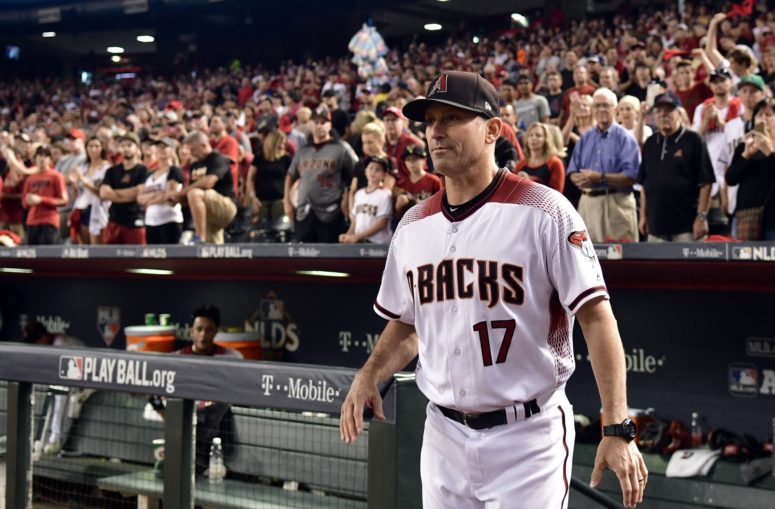
MMO: I love watching SNY and having you recount stories from your days with the Mets. You told a great Robin Ventura/Bobby Valentine story a few weeks back, and it’s been noted how close you and Ventura were. What made your friendship work so well?
Todd: I’ve known him since high school, not well. He was playing summer baseball as a high school senior with Torey Lovullo, who is now the manager of the Diamondbacks. Torey and I were roommates at UCLA, I went to Alaska and Torey went to Santa Maria. He called and said, “There’s this kid Ventura who’s a high school senior. We’ve got to get him to UCLA.”
When summer ended, we talked to one of our coaches and we’re like, ‘This kid’s sitting out there with one offer from Oklahoma, he’s dying to come to UCLA. We’ve got to get him.’
I got to meet him at that point, but our guys said, “We don’t think he’s going to be able to hit for any power, and he’s too slow.”
And looking back he was named college player of the decade [by Baseball America].
We had a little run at that point and then we’re very similar in a lot of ways. We have low-key personalities, I love his sense of humor and he’s a great family guy. Salt of the earth teammate has your back and we just really clicked.
MMO: You also mentioned in that same SNY clip that when Ventura dressed up like Piazza during the rain delay at Yankee Stadium that it was a turning point for the club. Can you explain that further?
Todd: I think it was sort of a display publicly that we were loose and we were not feeling like underdogs. We felt we had confidence. We played every day like that display there: we had fun.
We had guys on that team like Todd Pratt, Pat Mahomes and Derek Bell. Mike Hampton was intense but when he wasn’t pitching he was funny and had great energy. We had this kind of cast of misfits in the way all of us came together. Besides Mike [Piazza] and maybe [Al] Leiter, there wasn’t the superstar players on that team.
We banded together and found ways to win and had a lot of fun doing it. I think that was what was exemplified in that moment and I think it just kind of solidified our confidence. We played well and gelled as a team from that point on for sure.
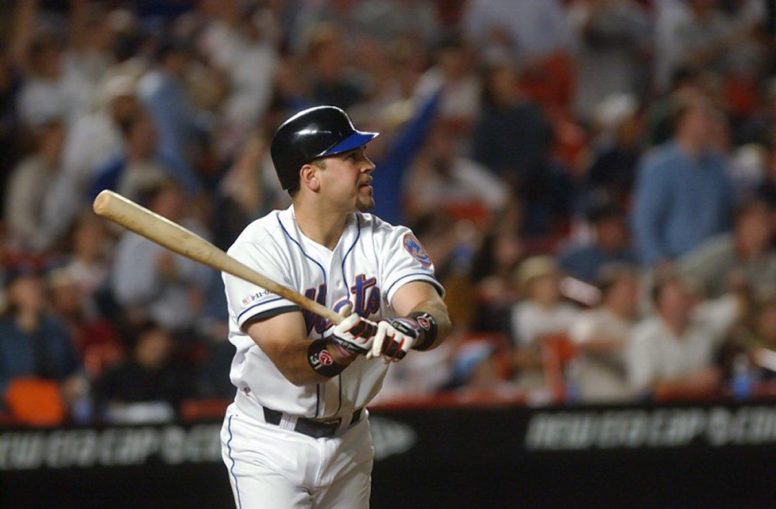
MMO: Do you have any specific Mike Piazza stories that stand out to you?
Todd: Not specifically. Mike had a lot on his shoulders and he had to, especially given the spotlight of New York City.
One thing that I remember that was a testament to him, and an example of what kind of personality he was in New York sports, was when we went to Japan to open up the season against the Cubs. We played a couple of exhibition games. One day with our regular crew of me, Robin, Leiter, Johnny Franco and Mike, decided to go check out this fast metro in Tokyo and go to lunch.
We walked through and you could see people starting to notice him. The crowd got a little bit bigger and then got a little bit bigger. We got on the train and by the time we knew what was happening, Mike was pinned in the very back of the train with hundreds or thousands of people cramming onto the train to just get a look at him and try to touch him. We surrounded him like a football team surrounds a quarterback to try keep the people away.
It was the first time I actually think I saw a little bit of fear in his eyes because of the fandom of the Japanese people. He was already hugely popular from his time with the Dodgers in Japan; he had done some big endorsement deals over there. We used to tease him about being the big shot, and I don’t even think we recognized until that moment how revered he was outside of just New York City.
MMO: A moment that stands out for many Met fans when thinking of you was your production during the Subway World Series in 2000. Particularly in Game 1, when in the sixth inning and Timo Perez on first with two outs, you hit a shot to left that looked like it was a two-run homer. That would’ve given you the early 2-0 lead, however, the ball came back into play and Perez was thrown out at home. What are your memories from that play?
Todd: I thought it was out, and maybe with instant replay in today’s world it would’ve been. I thought I hit it well enough to get out; I knew it was a line drive so it had to stay up but that time of the year the ball doesn’t carry quite as well.
I think Timo was thinking the same thing I was thinking. He just got caught in the worst place to be thinking that than I was.
I was running and digging for second and he just thought it was gone and hesitated a little bit and had to try to kick it into gear. The rest of that play was just so dynamic from [David] Justice to [Derek] Jeter to [Jorge] Posada in just an amazing bang-bang timing to get him.
But still to this day, when I’m in New York and walking down the streets and somebody that’s a Mets fan recognizes me, that’s usually the first thing that comes out of their mouth: “Oh, Timo.”
MMO: Did Perez take a lot of heat for not busting it with two outs?
Todd: I think a lot of people felt the same way he did, even after that fact. Maybe the ball had hit off the back wall and came back. I think a lot of people gave him some latitude on that because it did seem like a home run.
It just was a shame given what that situation was with two outs and ends up being an inning-ender when it could’ve been a turning point of the game.
MMO: Of course, another big moment that stands out from your time with the Mets was the first baseball game played in New York following the horrific terrorist attacks on 9/11. What were the emotions like that night, and what do you remember from that time?
Todd: That’s obviously a huge Piazza moment, but I think it’s so talked about that’s why I didn’t bring it up when you asked me about him [prior]. People ask me since I played for eleven different teams, why were the Mets so special? I told you about the camaraderie and the way the team gelled, a World Series appearance and then living through 9/11. Those are the primary reasons in that.
That was something that was hugely emotional for me as a player, and I know for my teammates. We had an opportunity to go and visit with firefighters and families of the fallen and as you remember, we were wearing the hats of the first responders. That was something that became a controversy because the hat that was given to me was actually by a firefighter, and I wanted to wear it for our first game back. We got some more of them and our first game back was in Pittsburgh. We were contacted by the commissioner’s office that we violating the dress code and were not allowed to wear those hats and we’d be fined.
When we came back to New York we got another memorandum just saying that those hats were not a part of the official uniform and we can’t wear them. I was the one quoted because I was the player rep and I happened to be the one that was in front of the media, but everyone had the same thought: You’re going to have to come tear them off our heads if they think we’re not going to wear these hats tonight.
That was just setting the stage. It was a truly emotional and one of a kind experience that was just extenuated and had the exclamation point with Mike and the big home run in the eighth. That was a well-fought game by both teams that had the right moment decided, it was for the people.
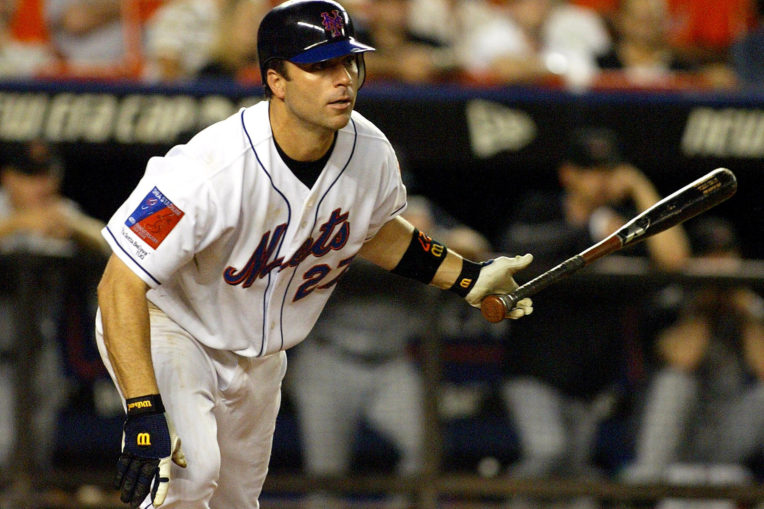
MMO: Your final game on October 3, 2004, was a memorable way to go out. Not only did you get to catch one last time, but your final at-bat resulted in a three-run home run. Can you talk about that day?
Todd: I really felt it would be fitting to go out the way I came in. I had gotten to catch earlier in the year and when I wasn’t playing all the time I used to like to go down to the bullpen and catch some of the guys once in a while. I used to catch [Tom] Glavine in the bullpen. It was well documented that I was done and there wasn’t any question that I was coming back, even though I had contemplated signing an extension at the All-Star break. I had already made up my mind.
So I asked Art Howe, ‘Can I catch the final game?’
He said, “Make sure it’s alright with Glavine because it’s his start.”
We talked about it and he said no problem. It was a thrill, it was awesome. Having my last at-bat end with a three-run home run was amazing. I think that the dynamics of that at-bat were sort of really unusual.
The count went to 3-0 and I literally thought to myself, This is going to be the most anticlimactic ending to a career that there will ever be. I’m going to walk on four pitches.
[Claudio] Vargas delivered the 3-0 pitch and it was a ball, and Angel Hernandez called it a strike. I was thrilled, it actually sent energy into me. I actually turned to him and thanked him. In my head I said I was swinging at this pitch no matter where it is, I’m not going to go out with a walk.
I was geared up to hit. Vargas throws hard and he threw up in my eyes but I was so geared up to be swinging that I was able to connect.
The irony of that for me was my first home run in the big leagues and my last was very similar, line drives that hit the second deck of the facade and bounced back onto the field.
Those are the only two home runs that I have the ball: my first and my last.
MMO: How difficult was it for you to be constantly on the move as much as you were during your career, playing for eleven clubs in sixteen years?
Todd: It’s difficult, it was really tough on the family. I think the family is really the victim in that because they make it pretty easy for us once you play for a team or two. You kind of get used to what it’s like to get into a different clubhouse and then you know some of the guys once you’re a veteran by the time you move a lot. I wasn’t going to be trying to find a job or whatever, I was going because there was some need, or perceived value that I was bringing to that team, whether it was for the playoff stretch or to mentor somebody coming up.
It was easier on me than it was on my family. Honestly, the two biggest lows for me, I mean, I gave you some description of the Cardinal moves, I thought there was a chance that I would be there my whole career. I thought I was going to be one of those guys that they were going to try and lock me up and be a long-term guy. Stuff with ownership and the way that went down was really disappointing at the time.
Then when I signed with L.A., it was home. I was in the house with my family in the place where I grew up watching baseball. That trade with Mike (May 1998) was devastating at the time because of all the other surrounding factors.
It turned out to be one of the best things that happened to me for my career. I ended up with Texas in the playoffs and a World Series in New York. So you just never know in this world of baseball and this world of professional sports.
If there’s anything I can tell kids when I speak at Little Leagues, I say, ‘You know what? I was a catcher my whole childhood and played in almost 1,500 games at third base, without ever having been in fair territory before. I played for eleven teams but that got me to the playoffs and World Series. You just never know what the road is going to look like, but you have to be able to adapt and be ready for changes.’
That’s just the nature of this world.
MMO: What can fans expect from you this season on SNY? Will you be making regular appearances?
Todd: I am. I’m really pleased that another business opportunity – a multi-sport video game platform – [came up] that I’ve been working on the licensing side of, which I can’t divulge too much yet. But we’ll have more to tell on that.
The point is it brought me to New York and gave me a real opportunity to reconnect with the Mets and to get my feet wet with SNY. That’s really been a blessing because it’s given me an opportunity to be a studio analyst and get an opportunity to do a couple of spring training games in the booth.
I’m going to do some more pre and post games during the season this year. It’s been a real blessing for me to be back in New York City and be involved with the Mets and SNY.
MMO: I greatly appreciate your time today, Todd. Looking forward to your continued work with SNY.
Todd: No problem. I appreciate it.
Follow Todd Zeile on Twitter, @Todd_Zeile





